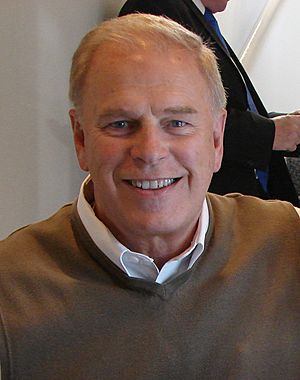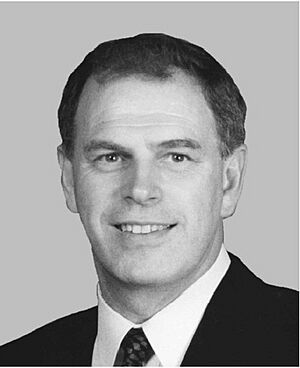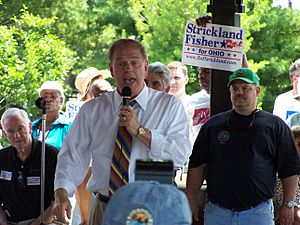Ted Strickland facts for kids
Quick facts for kids
Ted Strickland
|
|
|---|---|

Strickland in 2008
|
|
| 68th Governor of Ohio | |
| In office January 8, 2007 – January 10, 2011 |
|
| Lieutenant | Lee Fisher |
| Preceded by | Bob Taft |
| Succeeded by | John Kasich |
| Member of the U.S. House of Representatives from Ohio's 6th district |
|
| In office January 3, 1997 – January 3, 2007 |
|
| Preceded by | Frank Cremeans |
| Succeeded by | Charlie Wilson |
| In office January 3, 1993 – January 3, 1995 |
|
| Preceded by | Bob McEwen |
| Succeeded by | Frank Cremeans |
| Personal details | |
| Born |
Theodore Strickland
August 4, 1941 Lucasville, Ohio, U.S. |
| Political party | Democratic |
| Spouse |
Frances Smith
(m. 1987) |
| Education | Asbury University (BA) University of Kentucky (MA, PhD) Asbury Theological Seminary (MDiv) |
| Signature | |
Theodore "Ted" Strickland (born August 4, 1941) is an American politician. He served as the 68th governor of Ohio from 2007 to 2011. He is a member of the Democratic Party. Before becoming governor, he was a U.S. Representative for Ohio's 6th district. He is the last Democrat to have been governor of Ohio.
In the 2006 election for governor, Strickland won with 60% of the votes. He defeated Ken Blackwell. However, he lost his re-election bid in 2010 to John Kasich. After his time as governor, he worked for a public policy group. He also ran for the United States Senate in 2016 but was not elected.
Contents
Early Life and Education
Ted Strickland was born in Lucasville, Ohio. He was one of nine children. In 1959, he graduated from Northwest High School. He was the first in his family to go to college.
He earned a Bachelor of Arts degree in history and psychology from Asbury College in 1963. He then received a Master of Arts degree in counseling from the University of Kentucky in 1966. In 1967, he earned a Master of Divinity from Asbury Theological Seminary. Later, in 1980, he completed his Ph.D. in counseling psychology at the University of Kentucky.
Strickland worked as a counseling psychologist. He also served as an administrator at a children's home. He was a psychology professor at Shawnee State University. He is an ordained minister in the United Methodist Church.
Becoming a Politician
Strickland first ran for Congress in 1976, 1978, and 1980. He lost these early races. In 1992, he ran again for the 6th District seat in Ohio. This time, he won by a small number of votes. He started serving in Congress in January 1993.
He lost his seat in 1994 but won it back two years later in 1996. He served in Congress until 2007. During his time in Congress, he worked on committees dealing with energy, commerce, and veterans' affairs.
Serving as Governor of Ohio
In 2006, Ted Strickland ran for Governor of Ohio. The previous governor, Bob Taft, could not run again. Strickland chose Lee Fisher as his running mate. He won the election on November 7, 2006. He became governor on January 8, 2007.
Economic Decisions
As governor, Strickland faced financial challenges. In 2007, Ohio approved a $52 billion budget. However, he had to make cuts to state spending due to less money coming in. He reduced the state's "rainy day fund" (savings) to help balance the budget. This helped prevent a much larger financial problem for Ohio.
He also signed a law in 2008 about renewable energy. This law aimed for 25% of Ohio's electricity to come from renewable sources by 2025.
Education and Veterans
Strickland worked to improve education. He created the University System of Ohio to connect the state's higher education schools. He also supported programs for military veterans. He signed a law that removed state taxes on veterans' retirement benefits. He also made it easier for veterans to attend Ohio's public colleges.
Social Issues
On the topic of capital punishment (the death penalty), Strickland delayed some executions to review cases. He changed five death sentences to life in prison. Later, after leaving office, he said he regretted not stopping all executions.
He also signed a law in 2008 called the castle doctrine. This law helps people protect themselves if someone illegally enters their home or car.
During his time as governor, a change to Ohio's constitution was approved. This allowed casinos to be built in cities like Cincinnati, Cleveland, Toledo, and Columbus.
After Being Governor
After his term as governor ended in 2011, Strickland remained active in public life. He helped gather signatures for a public vote on a law that affected public employees' rights. This vote successfully overturned the law.
He also became a fellow at the Harvard Institute of Politics. In 2013, he was nominated to be a representative to the United Nations. From 2014 to 2015, he was president of the Center for American Progress Action Fund. In 2024, he joined other former governors in urging current governors to certify election results.
Views on Climate Change
Strickland believes that climate change is a real issue. As governor, he supported laws to promote renewable energy. He has stated that the focus should be on how climate change affects communities.
2016 U.S. Senate Election
In 2015, Strickland announced he would run for the United States Senate. He challenged the current Republican senator, Rob Portman. Former President Bill Clinton supported his campaign. However, Strickland lost the election to Portman in November 2016.
Images for kids
 | William L. Dawson |
 | W. E. B. Du Bois |
 | Harry Belafonte |









